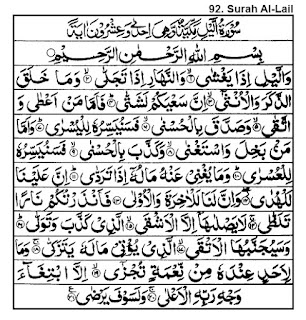Learn English Translation and Tafsir of Surah al-Layl Ayah 12-21
92:12 Surely, upon Us is the guidance,
92:13 and surely, to Us belong the Last and the First.
92:14 Thus, I have warned you of a Fire that flames,
92:15 which none burns therein but the most wretched,
92:16 who denies and turns away.
92:17 And the most God-fearing shall be kept away from it,
92:18 he who gives his wealth to purify himself.
92:19 And no one has any favor on him to be repaid,
92:20 save for seeking the Face of his Lord, the Most High.
92: 21 And he shall surely be pleased.
Relationship with the Previous Part
The previous part mentions that the deeds of people are different and that the good-doers will easily be guided to the right path while the evildoers will easily be guided to the path of misguidance and hardship. Then this part mentions that Allah makes the path of guidance clear and desirous, makes the path of misguidance clear, and warns of following it. It also confirms that Allah alone is the Owner of this world and the Hereafter. In addition, Allah affirms that His kingdom will increase nothing if people follow the path of guidance, and that He will not negatively be affected in the least if they follow the path of misguidance, that He gives whatever He wants to whomever He wants. Thus, happiness in this world and the Hereafter should be sought from Him alone.
Tafsir
92:12 Surely, upon Us is the guidance,
92:13 and surely, to Us belong the Last and the First.
Allah makes the right and wrong path clear to people and reveals to them the outcome of following each one of them. Allah, out of His wisdom and mercy, sent His Prophets and Messengers to show people the path of guidance and warn them of the evil end of following the path of misguidance. Thus, those who want to follow the right path can follow it and those who want to follow the wrong path can follow it; however, each party will bear the consequences of their choice. Allah is just and He will justly recompense each person according to his deeds, good or evil.
Furthermore, Allah alone owns this world and all that is in it and He owns the Hereafter and all that is in it. Allah’s creatures are under His will and authority. He gives and withholds what He wants to whomever He wants of His creatures. This universe and all that is in it belongs to Him alone.
Indeed, Allah is generous. He guides those, whom He loves to obey Him and follow the right path, and He will reward them immensely in the Hereafter, and He, out of His wisdom, forsakes whomever He wants of His slaves by letting them disobey His commands and make them suffer severe punishment for following the path of misguidance.
92:14 Thus, I have warned you of a Fire that flames,
Whoever believes in Allah’s Oneness, fears Him by obeying His commands and avoiding His prohibitions, and spends of his wealth for Allah’s sake will be successful. Similarly, whoever disbelieves in Allah’s Oneness and is stingy will be a loser. All matters are under Allah’s control. The matter is clear.
Allah warns us of a Fire that flames and that is prepared for the disbelievers and the wicked.
92:15 which none burns therein but the most wretched,
92:16 who denies and turns away.
On the Day of Judgment, the most wretched who disbelieves in Allah’s Oneness, disobeys His commands, insists on wickedness, and turns away from the right path will suffer the severe torment of the fire of Hell.
92:17 And the most God-fearing shall be kept away from it,
92:18 he who gives his wealth to purify himself.
One of the characteristics of the style of the noble Quran is to mention something and then mentions its opposite to make the image clear and bring home the intended meaning. After mentioning the evil end of the wicked disbelievers, it is mentioned the happy end of the righteous.
The most God-fearing, who believes in Allah’s Oneness, obeys His commands, avoids His prohibitions, and performs righteous deeds for Allah’s sake will be kept away from the fire of Hell. This God-fearing person is used to spending his wealth to purify himself from sins and whatever thing displeases Allah, Exalted be He. He considers spending his wealth for Allah’s sake a means for increasing it since he is certain that his wealth is a blessing that Allah has bestowed on him.
The ayah expresses the idea that the believer will be kept away from the fire of Hell eloquently. It says that the believer will be kept away from Hell and its severe punishment. In another ayah in the Quran, Allah says, interpretation of the meaning, 21:101 Verily, those for whom the best reward has already decreed will be far away from it. 21:102 They will not hear the slightest sound thereof, and they will abide in that which their souls desire. [Surah al-Anbiya’] The meaning is as follows: Those whom the best reward already decreed will be far away from Hell. They will neither enter it nor be close to it. They will also not hear the slightest sound of Hell with its extremely burning fire, and they will be in Paradise enjoying all that their souls desire and lasting happiness.
92:19 And no one has any favor on him to be repaid,
92:20 save for seeking the Face of his Lord, the Most High.
92: 21 And he shall surely be pleased.
The God-fearing person spends his wealth on charitable acts for the sake of Allah, hoping that Allah will reward him immensely. He also does not spend his wealth on charitable acts to repay those who may have favors on him or for showing off; rather, his sole goal is to please Allah and attain His reward. Verily, Allah is generous. He will reward him the best reward and He will surely give him a reward that will please him and make him happy.
92:19 And no one has any favor on him to be repaid,
Imam Ibn Kathir, may Allah have mercy on him, said, ‘Some scholars of Tafsir say that Ayah [17 to 21] were revealed about Abu Bakr al-Siddiq, may Allah be pleased with him. Some scholars even say that there is a consensus on this issue. Undoubtedly, Abu Bakr is among those who are intended in the ayah and he is the most deserving person to be one of those included in the general meaning of these ayat as its literal meaning is general. Abu Bakr is the first person in the nation of Messenger Muhammad to enjoy such virtuous ethics, as he was honest, God-fearing, and generous. He spent his wealth to please Allah and help Messenger Muhammad, and he spent a great amount of his wealth for Allah’s sake without the presence of any favor that he should repay to those whom he helped.’
Learned Lessons from Surah al-Layl Ayah 12-21
• Allah’s wisdom and mercy necessitate showing people all that guide them to the right path and attainment of His pleasure. Allah has taken upon Himself to do so to make the lawful and the unlawful, and the obedience and disobedience clear.
• To Allah belongs the ownership of this world and the Hereafter. He alone controls and manages them, and He is the Giver of their rewards. He gives what He wants to whomever He wants. Whoever seeks to attain the reward of this world and the Hereafter from other than their Owner and King, Allah, has gone astray. The disobedience of the disobedient will not harm Allah in the least, the obedience of the obedient will not benefit Him in the least, and their harm or benefit affects only their doers.
• Allah warns of the punishment of Hell whose fire is burning extremely. No one will suffer its severe burning but the disbeliever who disbelieves in Allah’s Oneness, and His Messenger Muhammad, and turns away from the right path.
• The God-fearing will be kept away from the fire of Hell and its severe punishment. He spends his wealth on charitable acts for Allah’s sake without the presence of any favor that he should repay. His only goal is to please Allah and attain His reward. Indeed, Allah will make him well-pleased by rewarding him immensely.
The Noble Quran English Translation of Surah Al-Layl
The Noble Quran English Transltion of Tafsir Ibn Kathir, Surah Al-Layl
The Noble Quran Introduction to Surah Al-Layl English Translation and Tafsir


![An-Nawawi's forty hadith [2] Meaning of Islam and Ihsan](https://blogger.googleusercontent.com/img/b/R29vZ2xl/AVvXsEjcVdWrqhHJvH7uuUy5BPLaGg_2GcbmjUjGt8uNPYLmyAR8uf9SkjkKjQEmJ97MJ_FJrV4MpNXmVWj2rPMTH9phk3L99mjJ6cenz3E2gyX3xA4eqnsspKAjVuPZLypf7na7jDWTiSD3zrlVeZm8V0LjhLaXAPU__4ciy4D-cyyNDMDB1txUYToJpWQ4Yf4/w213-h320/sheikh-zayed-grand-mosque-sunlight-blue-sky-abu-dhabi-united-arab-emirates.jpg)






